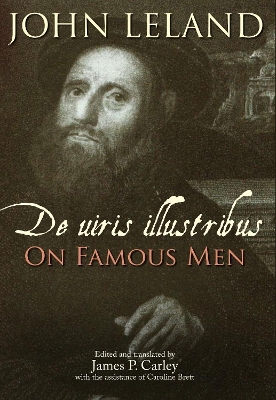British Writers of the Middle Ages and the Early Modern Period
1 primary work
Book 1
Equipped with a commission from Henry VIII, John Leland began to record the contents of English monastic libraries in 1533 before they were dispersed. His booklists were compiled as the primary resources for his comprehensive dictionary of British writers in four books, entitled De uiris illustribus.
This remarkable testament to medieval and early modern habits of book collecting, but also to history and national identity, lay incomplete at Leland's death. The sole extant witness to the author's ambitious task is the autograph manuscript, now Oxford, Bodleian Library, MS Top. gen. c. 4. Although antiquaries made use of De uiris illustribus over the next generations it did not see its way into print until 1709 when Anthony Hall produced a careless edition, a significant number of passages omitted, under the title Commentarii de scriptoribus Britannicis. Hall's text has formed the basis for subsequent scholarship.
This new edition is based on a thorough examination of the autograph, supplemented with readings from John Bale's epitome, now Cambridge, Trinity College, MS R.7.15 (753). True to Leland's original text, this new edition shows how unreliable and misleading Hall's was in many respects.
It includes a complete English translation, published on facing pages accompanying the Latin text. The translation seeks to capture Leland's own excitement with his project and also to convey his shifts in interpretation during the process of revision: the text mirrors in miniature the stages of the English reformation under Henry VIII. The extensive introduction provides a full history of the manuscript, examines sources, and shows the relationship of the text to Leland's booklists and other contemporary documents.
This remarkable testament to medieval and early modern habits of book collecting, but also to history and national identity, lay incomplete at Leland's death. The sole extant witness to the author's ambitious task is the autograph manuscript, now Oxford, Bodleian Library, MS Top. gen. c. 4. Although antiquaries made use of De uiris illustribus over the next generations it did not see its way into print until 1709 when Anthony Hall produced a careless edition, a significant number of passages omitted, under the title Commentarii de scriptoribus Britannicis. Hall's text has formed the basis for subsequent scholarship.
This new edition is based on a thorough examination of the autograph, supplemented with readings from John Bale's epitome, now Cambridge, Trinity College, MS R.7.15 (753). True to Leland's original text, this new edition shows how unreliable and misleading Hall's was in many respects.
It includes a complete English translation, published on facing pages accompanying the Latin text. The translation seeks to capture Leland's own excitement with his project and also to convey his shifts in interpretation during the process of revision: the text mirrors in miniature the stages of the English reformation under Henry VIII. The extensive introduction provides a full history of the manuscript, examines sources, and shows the relationship of the text to Leland's booklists and other contemporary documents.
